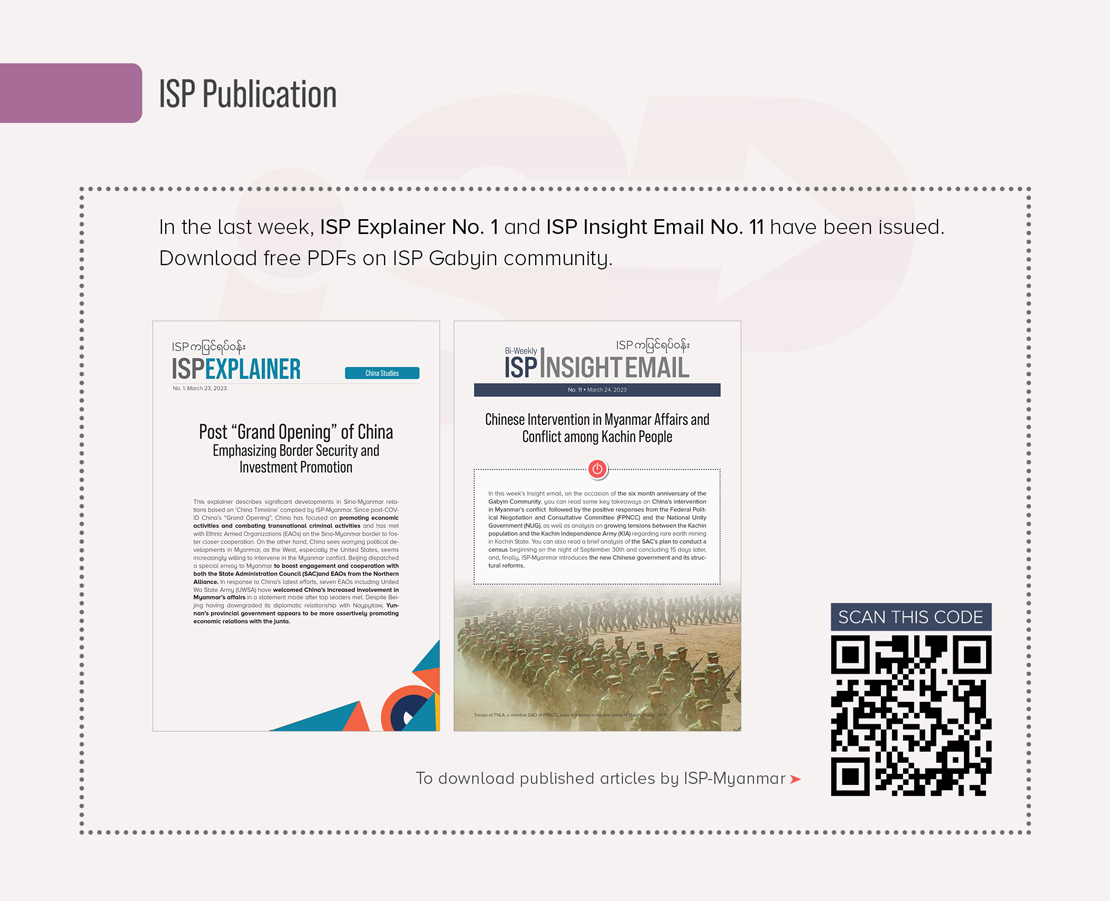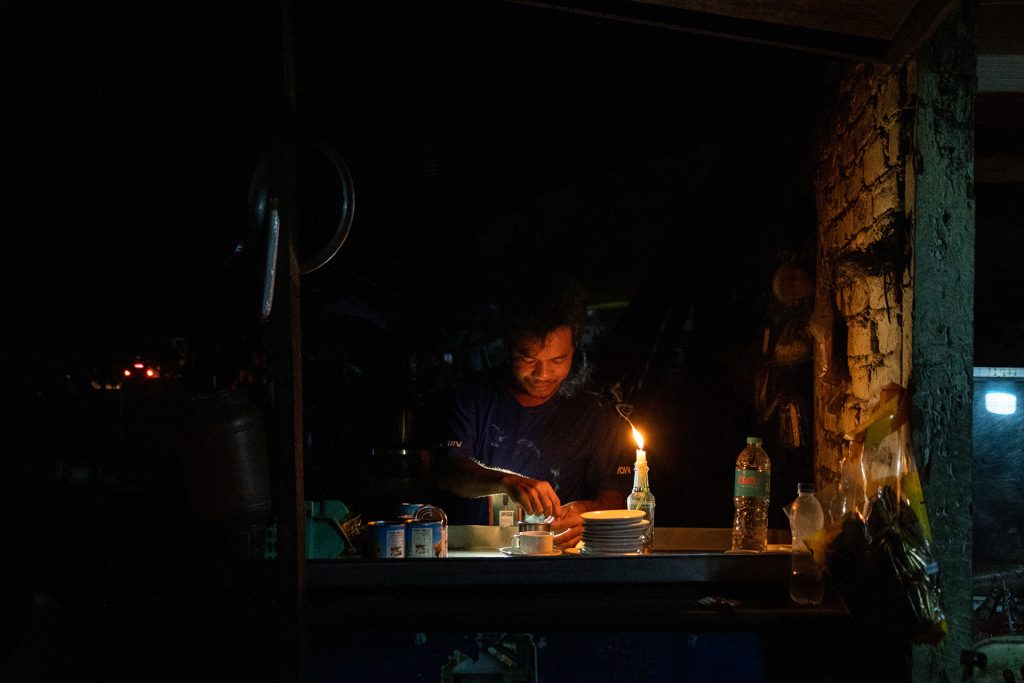Insight Email No. 12
ISP-Myanmar conveys well wishes for a safe and productive New Year for Myanmar Era 1385 and a happy Thingyan festival to Gabyin community members. In this Insight Email, ISP-Myanmar reports the legal abolition of 40 political parties, including the National League for Democracy (NLD), examines the increase in diplomatic expeditions to Naypyitaw, and assesses the withdrawal of foreign investment from Myanmar. This email also discusses Myanmar’s National Strategic Plan for the Advancement of Women (NSPAW) and developments surrounding the upcoming Thai elections.
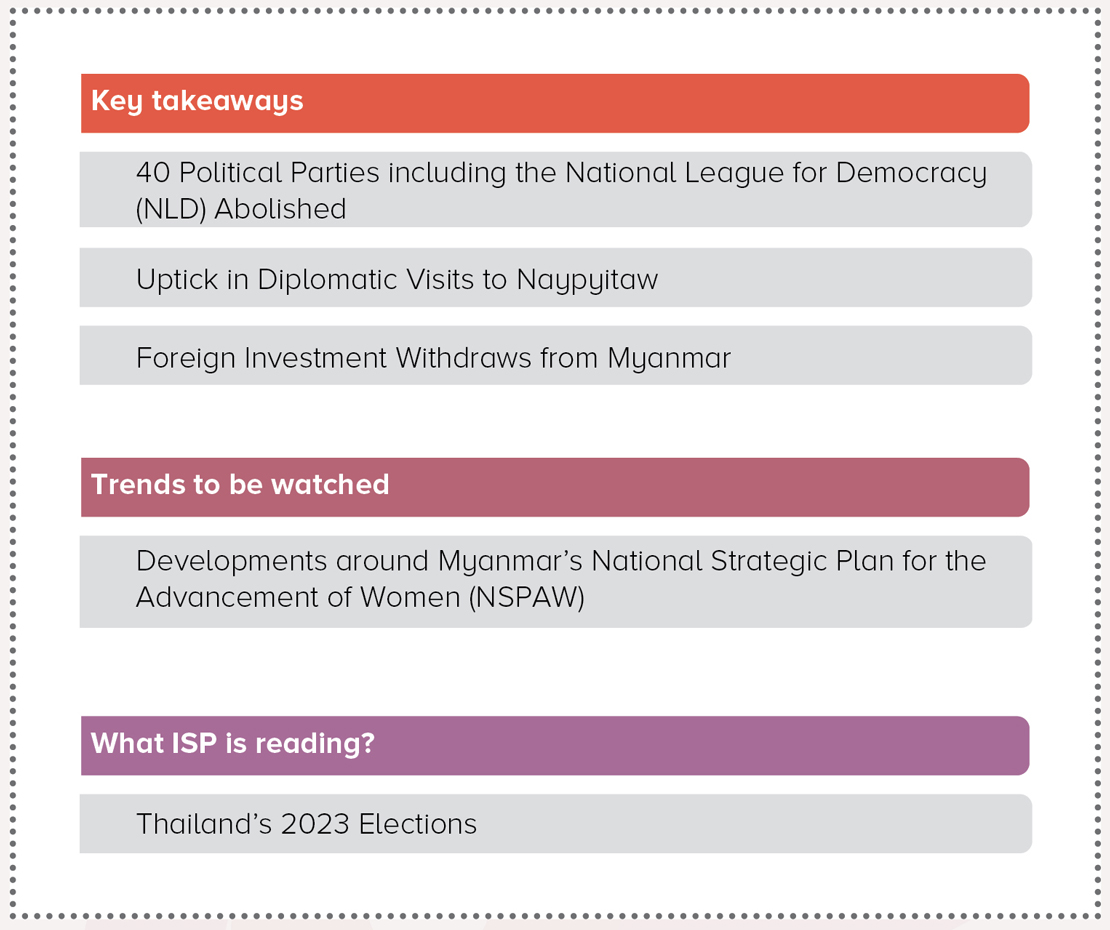
∎ Key takeaways
1. 40 Political Parties including the National League for Democracy (NLD) Abolished
The SAC announced a restrictive political party law on January 26 2023. According to the new law, all political parties were required to re-register within 60 days, or else be abolished. The SAC’s Union Election Commission (UEC) reported that more than fifty political parties have since registered, but that the parties victorious in the 2020 General Election, the NLD and the Shan National League for Democracy (SNLD) remain absent from the list. The UEC declared that as of March 28 2023, more than forty political parties are now legally abolished, including the NLD and SNLD. The UEC has yet to announce a date for fresh elections.
After the coup, the SAC annulled the results of the 2020 General Elections in a political decision which seemed an end for the most popular political party, the NLD. Meanwhile, the breadth of conflict has widened, making it now impossible to hold a nationwide election. Any eventual SAC elections will not reflect the true desires of the Myanmar people and would not resolve, but would likely worsen the conflict.
In their March report, International Crisis Group (ICG) analyzed the path to a 2023 Myanmar General Election as “A Road to Nowhere”. The ICG states “no foreign government or electoral organization should provide support for the elections, which the regime would cite as evidence that its polls are legitimate.”
2. Uptick in Diplomatic Visits to Naypyitaw
ISP-Myanmar has observed an uptick in diplomatic trips to Naypyitaw. Chinese envoys are the most frequent visitors, as China has been pursuing trade promotion with Myanmar’s junta through Yunnan Province of China (See ISPExplainer No. 1). Since the beginning of the year, many Yunnan officials have visited Naypyitaw. In February, Mr. Li Chenyang, Director General of the Commerce Department of Yunnan Provincial Department of Commerce, conducted a visit to Naypyitaw, Myanmar. Subsequently, in March, Mr. Wang Ning, a Central Committee member and CPC Secretary of Yunnan Province, along with a delegation, also arrived in Naypyitaw. During their visit, the delegation engaged in negotiations and signed several agreements with the Myanmar junta. These agreements encompassed areas such as Grain Supply Chain Cooperation, Fertilizer Supply Chain Cooperation, the Kyaukphyu Future Mobile Clinic Project, an MoU on import cooperation of agricultural produce in Myanmar, and the Power Purchase Agreement for Dapein 1 Hydropower Plant, among others.

In April, India’s Ambassador to Myanmar, Mr. Vinay Kumar visited Naypyitaw and held meetings with several ministers of SAC. Russia’s Deputy Defence Minister, Col. Gen. Alexander Vasilievich Fomin also visited Naypyitaw and received the Thiri-Pyanchi honor from the SAC; in turn, the Institute of Oriental Studies of the Russian Academy of Sciences conferred an honorary doctorate on SAC leader Min Aung Hlaing.
Myanmar and Laos also agreed to integrate cross-border power grids. And finally, the International Committee of the Red Cross (ICRC)’s resident representative, Ms. Elena Ajmone Sessera visited Naypyitaw on March 22 and held discussions with Myanmar officials on the repatriation of refugees in Rakhine State and other forms of cooperation.
3. Foreign Investment Withdraws from Myanmar
As foreign investments are withdrawn from Myanmar, many hotel and telecom companies are selling off their assets and leaving the country. Even smaller interests, such as Nestle dairy products and garment manufacturers, are now joining the exodus. At the end of February, Primark stopped taking orders, while two Chinese state-owned factories in Shwe Pyi Thar, namely GTIG and GY SEN (Primseng Guo) have shut down their businesses. Another Chinese-owned company, Alvin Sukali, which had been making shoes for export to the US and European markets, similarly shut down its factory and relocated to Cambodia in the second week of March. Even Myanmar garment factories producing clothing for the popular Japanese brand names, Uniqlo and GU, have have ended their production.
The closure of the CMP garment factories in Myanmar is a significant blow to the country’s grassroots citizens, with reportedly 3,000 workers left unemployed. Investor companies have cited supply-chain problems and concerns over human rights violations as reasons for their “responsible exit” from the country. On the other hand, severe electricity blackouts and the Central Bank of Myanmar’s financial control policies have also imposed additional burdens, making it difficult for businesses to operate effectively. Since the coup, more than 34 companies with a total estimated value of around USD 4 billion have terminated their businesses in Myanmar in one way or another. This exodus has had a significant impact on the country’s socio-economic situation, particularly affecting grassroots workers.
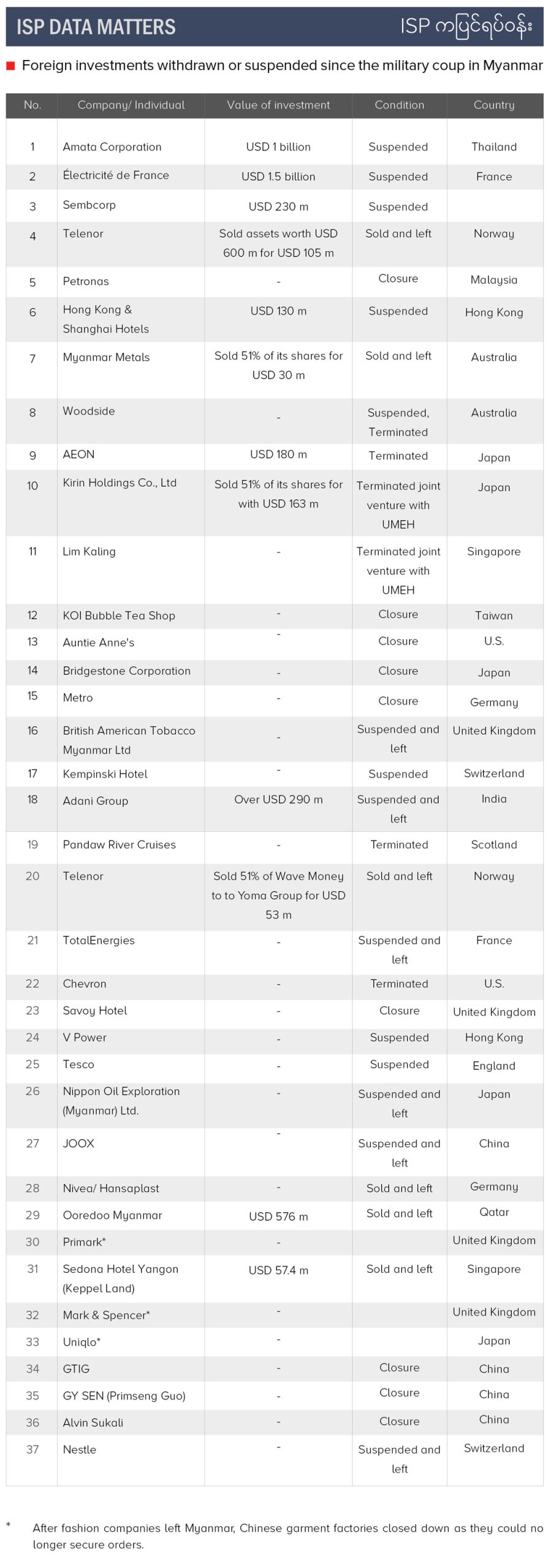
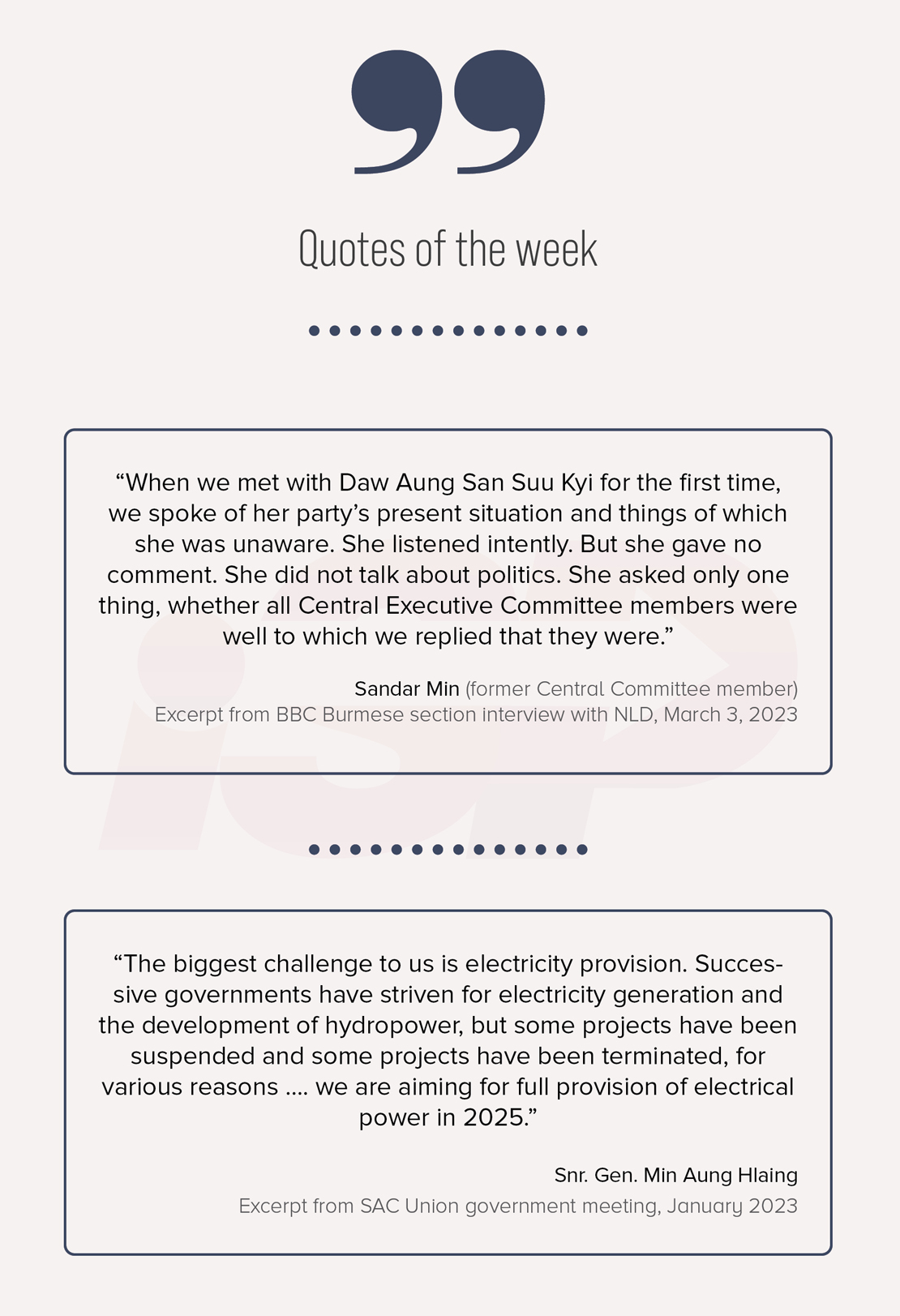
∎ Trends to be watched
Developments around Myanmar’s National Strategic Plan for the Advancement of Women (NSPAW)
Myanmar ratified the Convention on the Elimination of All Forms of Discrimination Against Women (CEDAW) in 1995. To promote gender equality and comply with the requirements of the Beijing Plan of Action, the Myanmar government adopted the National Strategic Plan for the Advancement of Women (NSPAW) in 2013. The NSPAW is a comprehensive plan spanning from 2013 to 2022, targeting 12 key sectors, including education, health, economics, violence against women, human rights, and women in armed conflict. However, the NSPAW has now expired, creating a potential setback in the country’s efforts to promote gender equality.
Having a national strategy and action plan, like the National Strategic Plan for the Advancement of Women (NSPAW) in Myanmar, is crucial for effective inter-governmental and inter-ministerial cooperation, implementation, monitoring, and enforcement of greater rights. The SAC’s Ministry of Social Welfare, Relief and Resettlement recently held a meeting on February 24 to discuss the completed implementation of NSPAW Phase I, and plans to draft Phase II of the plan by analyzing the strengths and weaknesses of Phase I; however details are not provided. If the SAC continues to work with the NSPAW, severe limitations will remain regarding all-inclusiveness and the helping hands of international agencies. Women’s rights activist groups consulted by ISP-Myanmar claim that the national strategy exists only “on paper” and is not actually working. Therefore, they are not interested in working with the SAC.
The National Unity Government (NUG) maintains a Ministry of Women, Youth, and Children Affairs. The ministry continues to operate, and promotes some policies, but its work is not aligned with the NSPAW. Women’s rights groups also seem uninterested in working on a similar document. However, prior to 2020, many groups had actively discussed “women, peace, and security” during the Union Peace Conferences. This discussion is particularly relevant now, as the conflict in Myanmar has intensified in many parts of the country.
∎ What ISP is reading?
Thailand’s 2023 Elections
Despite no announcement of the exact date for Myanmar’s new elections, Thailand has announced it will hold new elections on May 14, 2023 (Sunday). Political parties are now launching their respective campaigns. The election is to select 500 representatives for the ‘House of Representatives’. According to the Thai election system, citizens have to cast two ballots, one ballot voting directly for one of 400 single-member constituencies, and another ballot selecting their favorite party which elects the remaining 100 candidates from party lists. The 250 Members of the upper house (Senate) are not up for election, as they are appointed. When the Prime Minister (PM) is finally elected, the combined members of the Senate and House of Representatives (250+500) will choose who will rule the country. All parties are required to announce three candidate nominations for future PM. But in the Thai system, a non-elected person can still become Prime Minister.
Thai newspapers write that this election is no longer a ‘Dictator vs. Democracy’ fight. The political parties seem more policy-oriented, but many parties still court voters with populist policies. Many parties try to attract votes as well as businesses with their bright economic policy teams.
There are a few strong and potential contenders. The current ruling Palang Pracharath Party (PPRP) nominates its party leader, Gen. Prawit Wongsuwan. The current PM, Gen. Prayut Chan-o-cha leads United Thai Nation and intends his party to compete in all constituencies. The opposition, the Pheu Thai party hopes this election can be its turn to rule the country and Ms. Paethongtarn Shinawatra, 36, the youngest daughter of former PM, Thaksin Shinawatra, is a popular candidate in opinion polls. However, Mr. Srettha Thavisin, 60, a housing tycoon and chief advisor to Ms. Paethongtarn of the Pheu Thai party is also a potential candidate for the next PM. The Move Forward party is the most popular party among the younger generation and Bangkokians, and its leader, Mr. Pita Limjaroenrat, 43, is a popular contender as well. Other popular leaders are Mrs. Khunying Sudarat Keyuraphan of the Thai Seng Thai Party and the current Public Health Minister, Mr. Anutin Charnvirakul of the Bhumjaithai Party. The veteran Democratic Party, once a beacon of democracy but which has recently lost its appeal to voters. Former PM Abhisit Vejjajiva announced that he will not contest this election. The Democratic Party instead nominates Mr. Jurin Laksanawisit as its main candidate for PM.
Thai Chamber of Commerce analysis suggests that campaign spending will add another 120 billion Baht to the Thai economy, boosting GDP by 4% in the second quarter of the year. It seems that ‘money politics’ is still a driving force in Thai elections.
The campaign slogans of the Thai parties is also particularly interesting, all catering to populist appeal.
The ruling PPRP announced its campaign slogan of “700 Baht for all Thai citizens.” In the Thai language “Pom (Nickname of Gen. Prawit) and 700”, basically means 700 Baht worth of social welfare to all Thais. The elderly from the age of 60-69 will receive 600 to 3,000 Baht per month in support and those older than 69 will receive 4,000-5,000 Baht progressively. The party will back the industrial sector, with stimulus support similar to the Covid-19 era.
The current PM Prayut’s UTN makes similar claims of support for social welfare, of 1,000 Baht. The UTN party also continues the policies of co-pay in tourism and 50/50 support to elders. The UTN enters the election campaign with the slogan “Done, doing, and will continue”.
The party currently in coalition with the government, the Bhumjaithai party, promises a debt moratorium of 3 years for indebted farmers.
The opposition, Pheu Thai Party has issued campaign slogan of “One team for all Thais”. The party promises increased incomes, reforms the justice system, and promotion of infrastructure including technology infrastructure, as well as promotion of Thailand’s competitiveness. The Pheu Thai party raises the hopes of voters that the average citizen’s income will be 25,000 Baht per month in 2027. During the previous rule of the Pheu Thai, 11 years ago, the average monthly income was 15,000 Baht but should be re-adjusted with 17% of inflation. The party will create a digital wallet for all Thais above 16 years of age and every family should earn 20,000 Baht a month. For the digital generation, the party adopts a slogan of “One family, one soft power”. The party also proposes a six-point reform strategy for Thai democracy.
The Move Forward Party proclaims a slogan of “Firm ground, fair game, and fast forward growth”, literally meaning the party will build a firm ground through just laws for the promotion of the economy. The party said it will move from a situation of ‘Made in Thailand’ to a ‘Made with Thailand’ policy. The party proposes it can create 1.2 trillion Baht worth of economic growth through fostering a creative economy with 900,000 new jobs. The party also calls for reform of the government’s bureaucracy.
